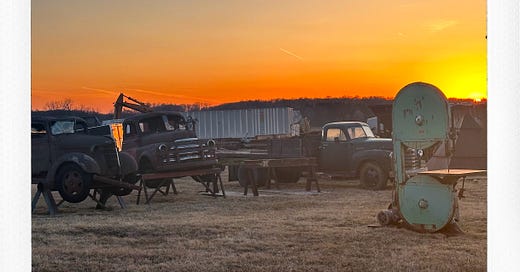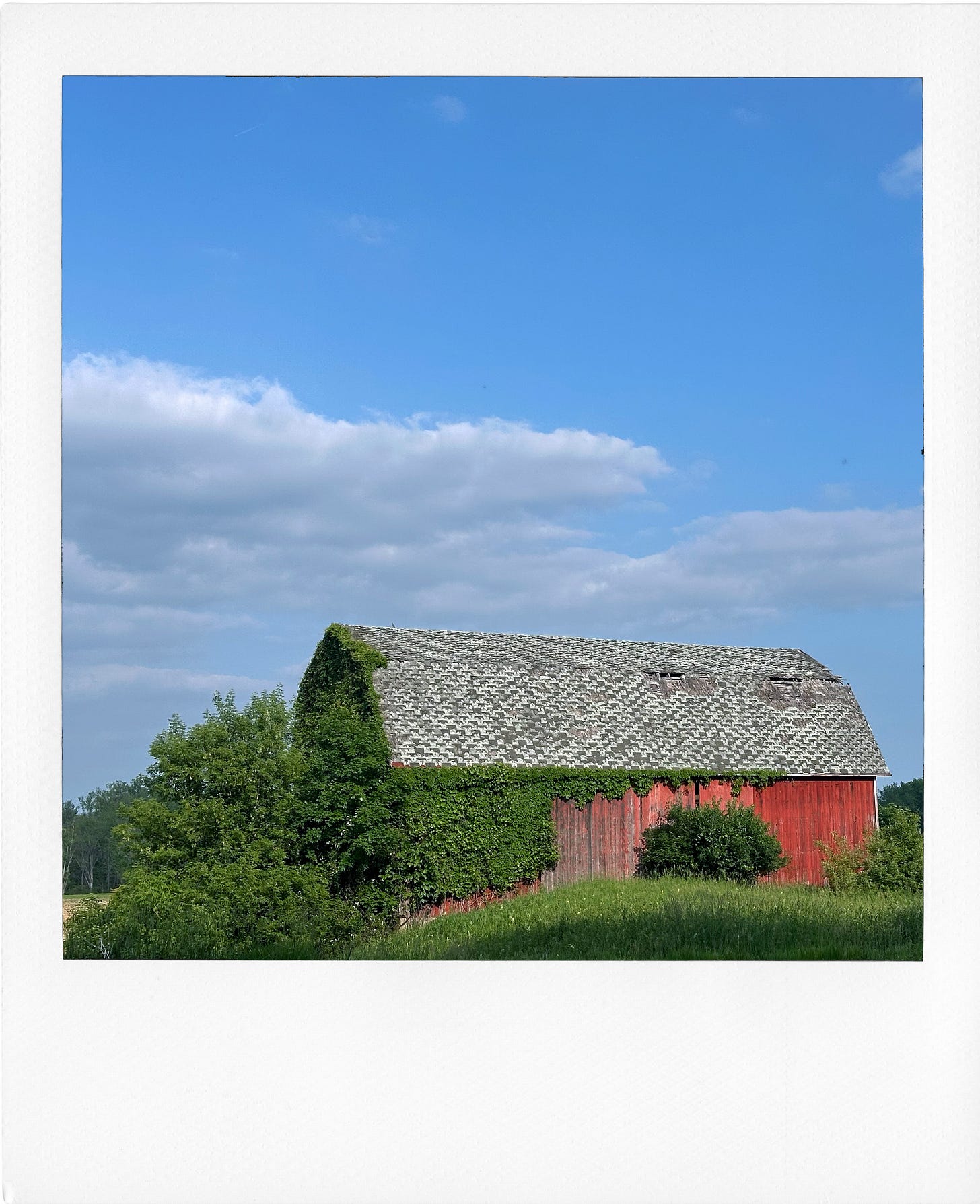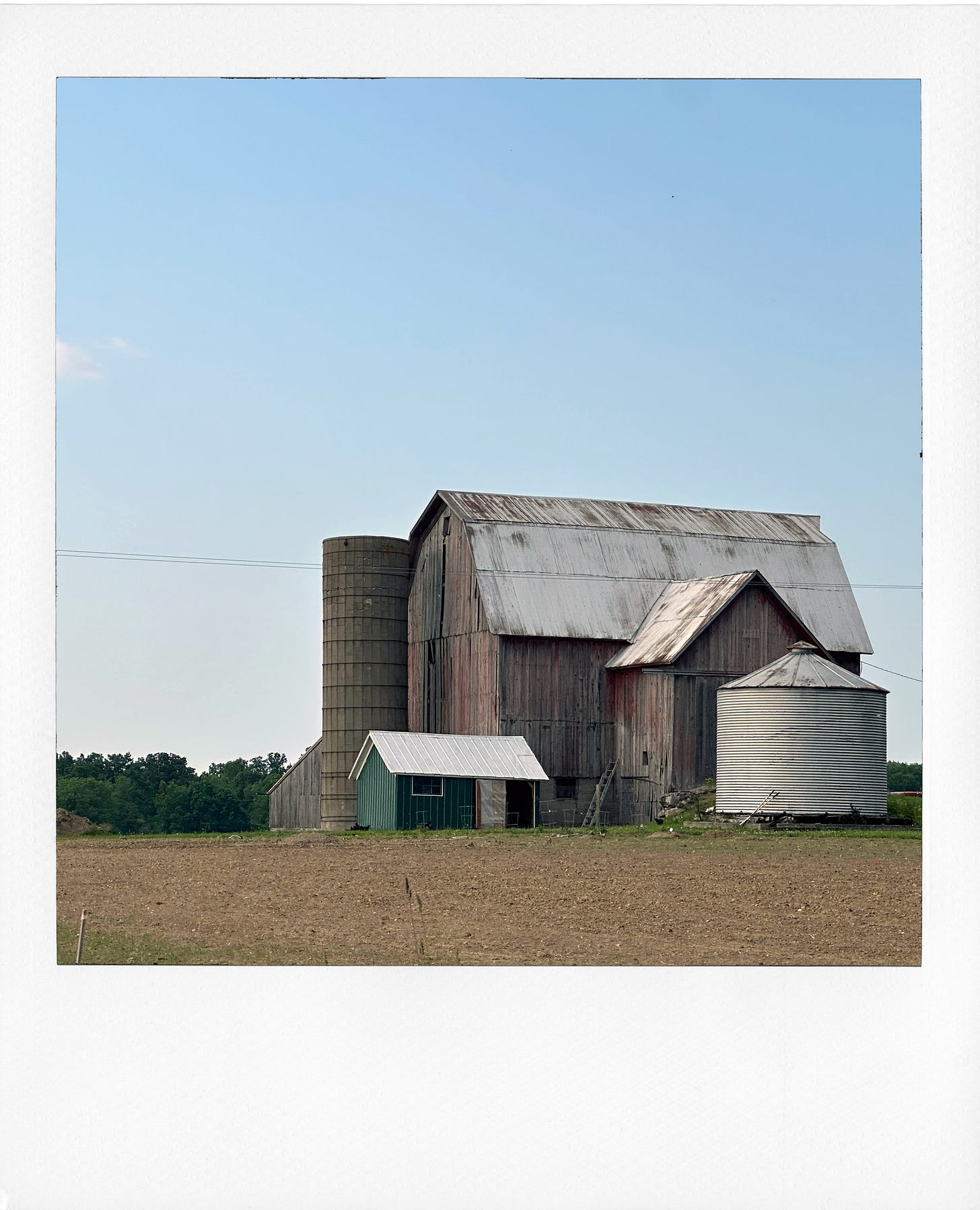There’s a long wide S curve on our main road just east of the village. The darn prettiest farm in the township lines both sides of the road. A long paved driveway leads back to a huge white farm house with black shutters and a green roof. It’s kept company by partnered alabaster structures roofed in green: a garage, barn, and workers quarters. It’s the farm that city people with Yellowstone-inspired country ranch farm dreams imagine for themselves.
Because it’s on the main road I can’t count how many times I’ve driven past the place. As a kid I’d settled in my head that the lord and leader of Michigan lived there. No one could possibly have a driveway that long and not be in charge of big sh*t. I never saw people go in or out and the place had two end posts with lions or something very similar to the gargoyles in Ghostbusters, so naturally I assumed the occupant was a haunted and/or evil lord and leader that moved only in the night. But I was willing to leave my family if I could live there.
The other side of the road holds acres of crops where corn grows tall enough for a corn maze in the fall. They kept an old classic red and white barn for the corn maze. Six white modern silos flank two ginormous barns. In front of two massive metal grain bins, there’s a work shed with a pull up drive way. You can buy a bail of hay for a couple bucks on the leave-cash-in-the-jar honor system. Without all that corn in the winter to catch the wind, massive snow drifts blow across the road enough to invite at least a couple car collisions each season. My friends and I call it the _____ death curve, named after the farmer that owns the place. We called it that before the fatal accident in February though. It’s supposed to be a way of telling each other to drive carefully.
The huge banners are up for the town Fourth of July festivities. The people in charge of beautifying our downtown area and organizing events like the fireworks display are on point. For as long as I can remember, we’ve had the best fireworks show in the county, and that’s including the fancy towns next to us with populations over 2,500. The main banner this year, several feet wide, hangs over the hardware store that a classmate’s family used to own. Not far down from where I witnessed several epic fistfights and paid a guy named Smiley buy us some El Toro.
I was taken back by the modern-ness of the banner. They’re really moving on up around here. Kind of a pop art outline of a striped firework and sizzlin spark. Right there. On the corner where my good friend’s youngest sister was hit by a truck. Two blocks down from the pizza shop where an employee helped a manager off her husband and throw him in a creek down the road. They were having an affair.
There isn’t a pretty or pastoral thing in a small town that doesn’t have a shadow. That’s what happens when a place doesn’t change. Sooner or later there isn’t a square inch of a place where something weird, untoward, unseemly, unethical, or unwanted hasn’t happened. Probably explains my tendency toward Midwestern Gothic.
I thought to document the small town experience after the election, thinking that there would be new era changes, interactions, and differences to report. Shows ya how long I’ve lived in the city. It is the unalterability of this place and places like them that inspire the nostalgic delusion of the real America. God’s country. Unchanging. Pastoral.
From what I understand, “God’s country” is supposed to mean where god’s beautiful creation, nature, is on display and there aren’t a bunch of humans1 around to get in the way.
Behind the myth that rural America is the Real America is the sentiment that things are better without (or with less) humans. It’s also the core philosophy behind eugenics, end times cults, and the man that blew up the fertility clinic in Palm Springs - just to name a few iterations. People want people to not be around their person.
So we’ve got one part of America believing it is their right to live peacefully in the country and for some reason it doesn’t match up with city dwellers who believe it is their right to live peacefully in the city. Only one of these groups is affiliated with the real America, and it really feels like all things are being held to a make-believe standard and reinforced by fear peddling media.
When the framers of the Constitution were still debating the shape of institutions we have today, 95 percent of America was rural, as the 1790 census classified the population. The Connecticut Compromise at the time created the Senate: one chamber granting equal voice to every state to counterbalance the House, where more populous states spoke louder.2
I can’t remember where I first picked up the small town vibe that cities are where you go to get murdered or go to see a Tigers game. I was a kid in the 80s. Detroit at that time was in post-white-flight decline. People wore T-Shirts that said “I’m so bad I vacation in Detroit”. I didn’t understand it but I gleaned from the adults around me that it was a different-kind-of-people thing, a racial thing.
And somehow, we were both superior and safer. If you don’t count the kidnapping scares, gang rapes in parked cars and cornfields, and the gruesome murder of a 14 year old girl at the local apartments next to the community park. Or the one at the gas station near the highway. Or far out in a country home on New years. But that’s our small town business. Cities have crime.
While the adults around me shuddered at the rampant crime in the city, the rest of the kids in Michigan and I were probably still soaking up PBB. All the stories I heard about city crime paled in comparison to my fear of haunted gargoyle farms and my questionable interactions with creepy adults in town. So I didn’t really catch urbanphobia. Seemed like an old person thing.
In high school I was friends with the kids that were interested in going to the deadly cities to hear satanic music3. We loved it. And we returned home alive and with our city-fearing parents none the wiser.
After graduation, I moved to Detroit for college. I stayed there for almost a decade. It is one of the best places I lived (and now seeing what twenty-somethings now are dealing with, one of the best times to be in your twenties). I’d come back here to see friends and family and a lot of them couldn’t fathom that people, let alone I lived there. Alive.
I lived in other cities in the following decades. In all that time, I never heard anyone talk about “taking out” or “cleaning up” or “leveling” rural America. Never heard them talk about country people leeching resources or not being real Americans. But the reverse? Well that’s sport for rural folks. One that I heard often growing up and, surprisingly and unsurprisingly all at the same time, still heard when I came back. The updated version includes more catch phrases like riots, looting, and pedos, but it is still the same.
The city crime reported on nightly news is always out of context and rural viewers almost always refuse to understand the context of a city. They don’t have to. They’ve been branded the real America. They think that’s an actual thing though, and not just a piece in a political power game.
The Electoral College is just one example of how an increasingly urban country has inherited the political structures of a rural past. Today, states containing just 17 percent of the American population, a historic low, can theoretically elect a Senate majority, Dr. Lee said. The bias also shapes the House of Representatives.4
It’s the resistance to change and worship of (the concept of) tradition that makes people ripe for fear mongering. Who’s more afraid than people that want things to stay the same in the middle of growth and advancements so rapid it’s all actually breaking our brains?
…there are genuine concerns that pre-date Donald Trump by decades. Take the anxiety that all Americans feel about the future, double it, and extend it back extra decades. That’s the story of rural America.5
But I’m not the authority on the urban-rural divide, I just sound like it. Kidding! I can only report what I’ve seen and experienced. I didn’t even have the time or space to get into Jason Aldean.
So yeah, I don’t have observations of change or difference to report this Rural Hours go-around either. Yet. I’m the one that took six months to realize that I’m in the area that was promised shelter and a biblical restoration of the American way of life. Everything is running the same as it ever was. Corn is growing for the corn maze. The fourth of July banner is up. Everyone is coming. That isn’t something you can say for cities right now. But no one around here cares. They traded their empathy for a fake title and false security.
The loss of empathy might be the most drastic change I feel in this place. Could be a dying generation, but it could also be cable news. Either way someone stole all the curmudgeoney old folks with a code. You know, the people that despite all the crap they say, would do anything to help another person, know when to put people before the government, and are ready to getcha where ya need to go. Your “I don’t care if they’re green or purple!” people.
The vanishing of these people could be the canary in the coal mine. I dunno. I do know that I don’t even need my low budget bird watching binocs to see ahead: Urban and rural America are traveling in opposite lanes and approaching the ______ death curve. I think the divide is far more essential to resolve than the politicians who benefit from it will acknowledge. I think it’ll be yet another thing up to us.
***
Drafty?
This was maybe more of a draft than a complete piece. I got into it and as always discovered there’s so much more and I put that stuff in and then took out even more and I was left with the soup above. I thought I’d throw it out there anyway. It’s a rural hours diary after all. Would love to hear in the comments (or DMs) if anything sparked a question or needs more zhuzh or heck - suggestions on direction or maybe some rural landscapes you’d like to see. Let me know!
A Must Read if You Aunt or Have an Aunt or Know An Aunt
I wrote a piece on aunting for Burning Mom newsletter (you should follow/subscribe if you haven’t already). Check it out:
Thank you for reading!
How that squares up with many alt right Christians believing that they, as humans - that are better when they aren’t around, are chosen. Or that they, who deny climate change are honoring creation, well that’s spiritual algebra.
From As American as Apple Pie? The Rural Vote’s Disproportionate Slice of Power https://www.nytimes.com/2016/11/21/upshot/as-american-as-apple-pie-the-rural-votes-disproportionate-slice-of-power.html
That’s country code for rock and roll.
From As American as Apple Pie? The Rural Vote’s Disproportionate Slice of Power https://www.nytimes.com/2016/11/21/upshot/as-american-as-apple-pie-the-rural-votes-disproportionate-slice-of-power.html
From They surveyed 10,000 rural voters. Here’s what they learned. https://www.politico.com/newsletters/politico-nightly/2024/02/22/they-surveyed-10-000-rural-voters-heres-what-they-learned-00142795







